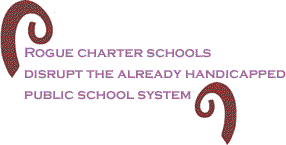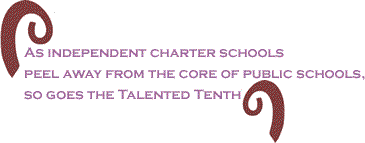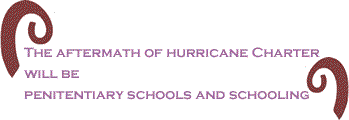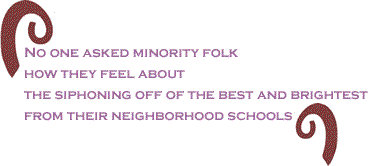
|
|||||||||||||||||||||
 |
|
Public Schools may seem like the problem but charter schools are not the solution. Education is in a constant state of revolving door politics. As presidents change every leap year, so does the fate of public policy. As an example, No Child Left Behind (NCLB) is the postmodern War on Poverty. In comparing former President Lyndon B. Johnson's War on Poverty to President George Bush's NCLB, both exemplify a sociopolitical plan postured as good American reform. Johnson's war on poverty hoped to break the cycle of poverty while President Bush's war on illiteracy hopes to improve public schools. Both of these plans seek to attack, what they believe to be, the social "problem" of the decade. Both prepare the underserved, focus on helping the poor and serve a largely minority audience. Both propose community action plans where communities are expected to save themselves from these social ills - poverty and illiteracy. These plans are posed as if one has a choice for "economic" or "literate" empowerment. Ultimately, they both seek to control poor and minority communities.
NCLB cannot empower or educate the underserved because this is not the plan of any political agenda. Political agendas are meant to cycle through the term of the presidency. They are not meant to work - just pacify - and pontificate a moral or social ideology. That is, the president has a heart. Recycling public schools into charter schools serves a political agenda not an educational need. As independent charter schools peel away from the core of public schools, so goes the Talented Tenth. Dubois should see us now. What was rotten at the core is now exposed in its rawness and the depth of educational inequities like poor teachers, outdated textbooks, dilapidated schools, inferior curriculum, miseducated children, uninvolved parents, trifling administrators and depraved communities are revealed in their "new clothes." Good intentioned administrators and folk alike believe that this new educational isolationism can benefit the poor and the minority. However, the segregation of a few from the many does not serve to educate all. Like capitalism, charter schools serve the interests of the majority who are tired of supporting poor and minority folk with their tax money (e.g., welfare reform). Let me break it down: the majority doesn't want to pay for public schools that their children do not attend. Charter schools solve this dilemma leaving more money in their pockets and less support for this country's social ills. The majority is taking back what they can to maintain their racial standing amidst the increasing numbers in ethnic populations. Check out projections from the US Census Bureau for the year 2030. To ensure the future of the majority's children a micro recolonization is necessary. They call it reform but poor folk know better. The pilgrims are angry. The siphoning of human capital is only the beginning.
Outlaw charter schools share in the limited pool of financial resources
(public, private and grant monies). Charter schools can choose to
discard naughty children. These schools are about
According to NCLB, priority is given to children from "low income families" and those who are the "lowest achieving." "Children are eligible for school choice when they attend any ‘persistently dangerous school' as defined by the individual state." There are persistently dangerous people, not schools. Can the option of school choice be afforded to teachers, staff and principals at these schools too? Public penitentiaries ain't no place for nobody. Either turn all public schools into independent charter schools, revamp the public school system or come up with some better solutions. These are the only choices. The aftermath of hurricane Charter will be penitentiary schools and schooling. The focus on the inclusion of poor and minority children is the masquerade of NCLB. The creation of choice, like charter, is about exclusion. I see a postmodern deficiency theory enacted here. Is it schools, minorities or the public school system that needs help? NCLB blames schools, teachers, school districts, and impoverished communities; they are all being held accountable for academic failure and under achievement. If we spread the blame, then by the end of Bush's administration, he will be blameless. All the goats will have escaped. Once Charter Schools have met the needs of the majority, a law or proposition will be enacted preventing the creation of future charter schools. Or better yet, out with the old president in with the new who sprouts new plans, deals and agendas for the poor and the minority. The rich and well to do will have accomplished their goal of educational re-colonization. The matter of an alternative school system must be discussed and remedied collectively by a task force of teachers, professors, parents and local, state and national government representatives. A national focus on the future of public schools, and in particular urban schools, must be a collective culturally conscious effort. Failure, time and time again serves no one. Many more children will be left behind.
It is not about changing the structure of the schools that will make a difference. Educational reform needs to be about reforming people, not school buildings. The 2008 election will bring a new president with a new social plan for the nation's poor and minority children. Do people really care or are people just careless? The federal government's god-like way of dealing with public schools has only been cause for nervous stomachs and sleepless nights. With the new administration will come, revamped rules and relic reforms. Voices against school choice aren't being heard or publicized to present a balanced perspective. No one asked poor folk how they feel about putting their kids in private schools. No one asked minority folk how they feel about the siphoning off of the best and brightest from their neighborhood schools. Will urban public schools become educational penitentiaries for the educationally underserved? Or will all public schools become charter schools? Then what's the point? It is impossible to improve the schooling of poor and minority children by depleting the ghettos' natural resources. Rogue charter schools disrupt the already handicapped public school system. More thought by experts on urban education needs to happen, because the present public circumcision penetrates deeply into the core of urban schools, its children and communities. These families are destined to be left behind and left out of the equation. Or maybe this is the intended solution. Patricia A. Young, PhD is an Assistant Professor, Department of Education, University of Maryland Baltimore County. She can be contacted at [email protected]. |
|
| Home | |
Your comments are always welcome. Visit the Contact Us page to send e-Mail or Feedback or Click here to send e-Mail to [email protected] e-Mail re-print notice
If you send us an e-Mail message we may publish all or part of it, unless you tell us it is not for publication. You may also request that we withhold your name. Thank you very much for your readership. |
|
| January 12, 2006 Issue 166 |
||||||||||||||
|
||||||||||||||
|
||||||||||||||
| Printer Friendly Version in Plain Text or PDF format. Download free Adobe Reader. | ||||||||||||||
 |
||||||||||||||
 |
||||||||||||||
| |
||||||||||||||
| |
||||||||||||||































